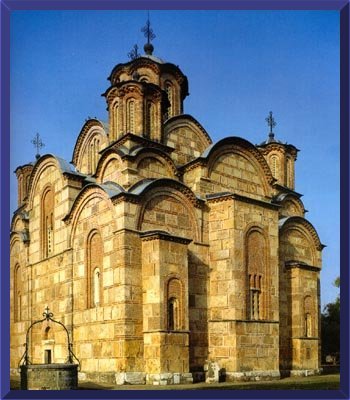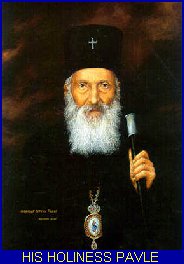 Kosovo
by William Dorich
Kosovo
by William Dorich



|
|
His Holiness Pavle
Introduction
 For centuries the territory of the Ras-Prizren Diocese was the center of our national and Church life. It remained so even after all the destruction by the conquerors, for on it are found the remains of the most important accomplishments of Serbian church architecture, art, and literature. These Kosovo remnants are lodged in the midst of the remaining faithful of the Kosovo region.
For centuries the territory of the Ras-Prizren Diocese was the center of our national and Church life. It remained so even after all the destruction by the conquerors, for on it are found the remains of the most important accomplishments of Serbian church architecture, art, and literature. These Kosovo remnants are lodged in the midst of the remaining faithful of the Kosovo region.
The Christian ethos of the faith of St. Sava, the faith which the people accepted and lived, even today, testifies that these attainments were realized with full knowledge of the awareness and eternal measure of man's worth and his labors, as well as the value of the labors of an entire nation based upon the Lord's words concerning the exalted good of service for the love of God and to one's fellow man.
This same ideal, that God and fellow human beings should be served, moved not only the powerful and rich, kings and noblemen, to erect churches and monasteries, but the common people, as well, to build them - and, when necessary, to again rebuild them from the ruins and ashes'as in the case of the artists, copiers, printers, and those nameless donors, like that of the hand-written minea in the Decani Monastery, a gift to the church by Slavo the Blind, and the "poor people of Prizren," great and small, who donated the silver cross to the Church of St. George, in Prizren, exemplifying this unselfish generosity.
In this way, long before Kosovo, our people learned and continued to strive for an understanding of a spiritually meaningful life and death. This means that love of God represents love of our fellow man; that the decision for the Eternal Kingdom of Heaven does not mean the denial of our passing life on earth, and that by our faith in the immortal soul we do not deny our personal ties to our historical life.
Belonging to a people with such an understanding, Prince St. Lazar truly confirmed the importance of this decision: more willing to disappear as
men than to live as cowards. For us there is no other choice: better a dead man than a living coward. For a man, though dead, is not dead before the living God. In His sight, the coward is dead even while walking the earth.
Today, when the dark clouds have again risen over Kosovo and Metohija, we need to remind ourselves and others of the truth that no one ever asked us where we wished to be born, and into what ethnic group, or in what land. For this we cannot be blamed. But, whether "as men" we are cowards or not, depends upon us - just as it depends upon us whether we shall live or disappear before God and mankind.
I believe that all those who participated in the publishing of this book did their best to present that which we accomplished through the centuries of our existence in the Kosovo region, as well as an offering in the struggle for truth, freedom, justice, and knowledge. As we reflect upon what the Serbian people would be without these monuments during our 500 years of suffering oppression, we must also consider what would we, today, be without them before ourselves and before others.
Her Royal Highness, Princess Jelisaveta Karadjordjevic, the editor, publisher, and contributing authors prepared this publication on a voluntary basis, and did so in behalf of Serbian victims. I owe a deep debt to these individuals who gave of their labor, as well as to those who donated their means, that this truly encompassing book was produced.
The efforts of the Kosovo Charity Fund of the Serbian Orthodox Diocese of Western America, along with this publication, add a contemporary humanitarian monument to the religious monuments of Kosovo and those of the Serbian Orthodox Church and contribute greatly to our suffering Kosovo. In the legacy of our Serbian land, Kosovo is our debt before God and before that suffering people who abide in their troubled hearths and who defend their holy places. Preservation of these priceless treasures (both spiritual and material) of the Kosovo region is for the benefit not only of the Serbs, but for all mankind.
Archbishop of Pec Metropolitan of Belgrade and Karlovci The Serbian Patriarch Belgrade
Vidovdan 1992. |